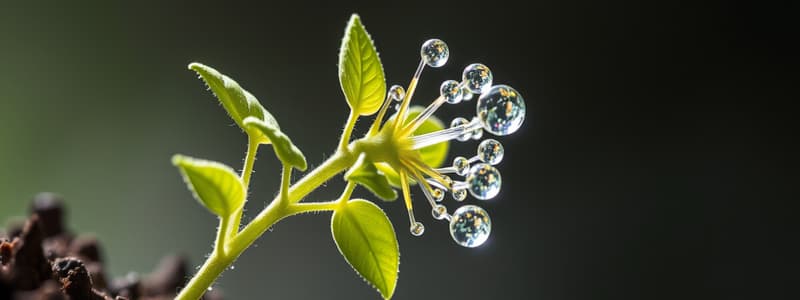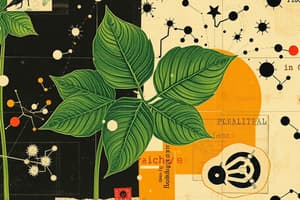Podcast
Questions and Answers
What is the primary function of photosynthesis?
What is the primary function of photosynthesis?
The primary function of photosynthesis is to capture light energy, convert it into chemical energy, and store this chemical energy in molecules of carbohydrates.
(A) Name a gas released as a by-product of the light dependent reactions of photosynthesis. (B) Name the molecule that is the source of this gas. (C) Why is oxygen removed from the molecule named in 2B?
(A) Name a gas released as a by-product of the light dependent reactions of photosynthesis. (B) Name the molecule that is the source of this gas. (C) Why is oxygen removed from the molecule named in 2B?
(A) Oxygen. (B) Water. (C) Water is broken down to provide hydrogen atoms for electrons.
Name two molecules that are produced during the light dependent reactions of photosynthesis and serve as temporary sites for energy storage.
Name two molecules that are produced during the light dependent reactions of photosynthesis and serve as temporary sites for energy storage.
Adenosine triphosphate (ATP) and nicotinamide adenine dinucleotide phosphate (NADP-H).
When a molecule gains an electron, the molecule has ?.
When a molecule gains an electron, the molecule has ?.
(A) True or False: All electrons contain the same amount of energy. (B) If this statement were true, could life (at least as we know it) exist? Why?
(A) True or False: All electrons contain the same amount of energy. (B) If this statement were true, could life (at least as we know it) exist? Why?
When chlorophyll P680 absorbs sunlight, what subatomic particle actually has a change in energy content?
When chlorophyll P680 absorbs sunlight, what subatomic particle actually has a change in energy content?
When chlorophyll P680 loses an electron, from what atom does the chlorophyll receive an electron?
When chlorophyll P680 loses an electron, from what atom does the chlorophyll receive an electron?
Which contains more energy: one molecule of NADP or one molecule of NADP-H?
Which contains more energy: one molecule of NADP or one molecule of NADP-H?
What is the name of the three-carbon molecule that is a product of the Calvin cycle?
What is the name of the three-carbon molecule that is a product of the Calvin cycle?
Name the molecule that is taken from the air and that provides the carbon for the production of carbohydrates during the Calvin cycle.
Name the molecule that is taken from the air and that provides the carbon for the production of carbohydrates during the Calvin cycle.
Flashcards are hidden until you start studying
Study Notes
Function of Photosynthesis
- Captures light energy and converts it into chemical energy.
- Stores chemical energy in carbohydrates such as phosphoglyceraldehyde (PGAL), glucose, or starch.
By-products of Light Dependent Reactions
- Oxygen is released as a waste product during photosynthesis.
- Oxygen atoms are derived from the breakdown of water (H2O) during light reactions.
- Water is split to provide hydrogen atoms, essential for electron replacement in chlorophyll P680, releasing oxygen into the atmosphere.
Energy Storage Molecules
- Adenosine triphosphate (ATP) and nicotinamide adenine dinucleotide phosphate (NADP-H) are produced during light reactions.
- These molecules temporarily store energy and transfer it to carbohydrates during the Calvin cycle (light independent reactions), which can store energy long-term.
Electron Gain and Energy Changes
- Gaining an electron indicates that the molecule has been reduced, resulting in energy gain.
Energy Variability of Electrons
- Electrons vary in energy levels; they can be classified as low or high energy.
- If all electrons had equal energy, life as we know it would not be sustainable because energy transfer is essential for biological processes.
Energy Change in Electrons
- In chlorophyll P680, when sunlight is absorbed, it is specifically the electrons that gain energy, creating a chain reaction in energy absorption.
Electron Replacement in Chlorophyll
- When chlorophyll P680 loses an electron, it receives a replacement from a hydrogen atom extracted from water.
- Removal of the electron from hydrogen leaves a proton, which later combines with an electron to form NADP-H.
Energy Comparison of Molecules
- NADP-H contains significantly more energy than NADP, as NADP-H is formed by the combination of a high-energy electron with a proton.
Calvin Cycle Product
- The three-carbon molecule produced from the Calvin cycle is phosphoglyceraldehyde (PGAL).
Carbon Source in Calvin Cycle
- Carbon dioxide (CO2) is used as a source for carbohydrate production during the Calvin cycle, sourced from the environment (air or water).
Studying That Suits You
Use AI to generate personalized quizzes and flashcards to suit your learning preferences.




